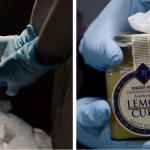
BREAKING: Wall Street Journal investigation finds Amazon.com selling actual “dumpster trash” food and supplements as NEW
Tuesday, December 17, 2019 by Mike Adams
http://www.products.news/2019-12-17-wall-street-journal-investigation-finds-amazon-selling-actual-dumpster-trash-food.html
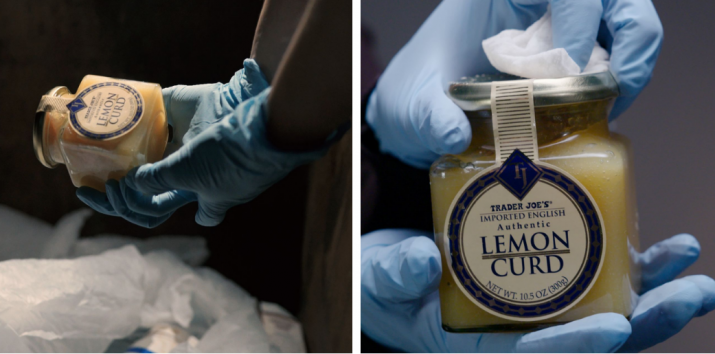
Items you purchase on Amazon.com that you think are new might actually have been packaged by dumpster divers who scour trash bins to find food items they can repackage and sell on Amazon, a shocking Wall Street Journal investigation has found.
The bombshell investigation reveals that Amazon.com is literally selling dumpster trash as “new” food and dietary supplements.
“Late one night several days before the store opened, reporters with flashlights and blue latex gloves visited Clifton, Clark and Paramus, N.J., scouring dumpsters behind outlets such as a Michaels craft store and a Trader Joe’s grocery,” reports the WSJ. “The bins were a humid mess of broken glass and smashed boxes, a stench of rot in the air. Several products were in original packaging, some soiled with coffee grounds, moldy blackberries or juice from a bag of chicken thighs.”
Among the trash, WSJ reporters found a jar of discarded lemon curd from Trader Joe’s.
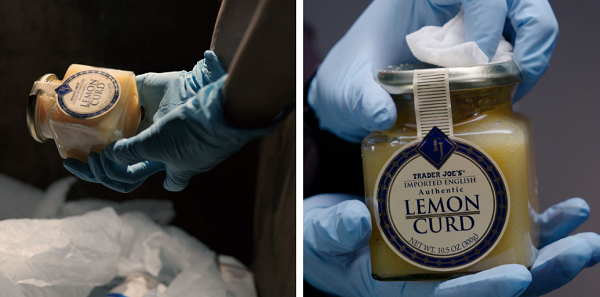
They decided to find out if they could successfully sell that item on Amazon.com:
The Journal cleaned and packed the three items—bubble-wrapping and taping the curd jar—and mailed them to an Amazon warehouse in Pennsylvania in September and October. The Journal completed Amazon’s documentation requirements by specifying the items’ universal product codes, the numbers next to bar codes on most products.
Amazon didn’t ask about the inventory’s origins or sell-by dates.
The Journal’s dumpster finds were soon up for sale with an Amazon Prime logo, available to millions of shoppers, including the listing for “Trader Joe’s Imported English Authentic Lemon Curd 10.5oz” at $12.00.
Here’s the screen capture of the trashed lemon curd for sale on Amazon as “new.” The WSJ says they quickly bought the product themselves so that no one else would:
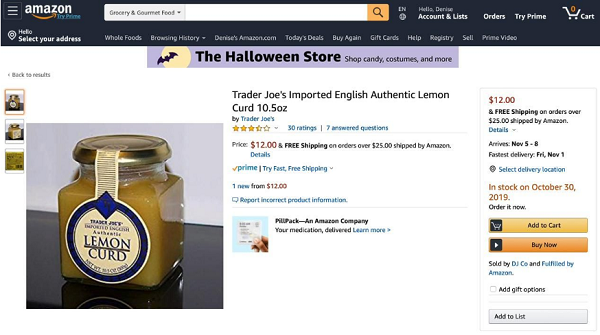
Fruit butter, olives, breath mints, sunflower seeds, cosmetics, over-the-counter medications and more… all TRASH sold on Amazon.com
WSJ reporters were able to scrounge for all sorts of food items by sifting through literal tons of dumpster trash, finding many that Amazon would accept for sale:
After a later dumpster dive, the Journal was able to go through almost all of the listing process with salvaged breath mints, sunflower seeds, marmalade, crispbread, fig fruit butter, olives, a headband and a Halloween mask—stopping just short of shipping them to the Amazon warehouse, which is required for an item to appear for purchase on the site.
The WSJ also found that even expired food products could sometimes slip past Amazon’s warehouse workers, allowing them to be sold on the live Amazon website:
Workers sometimes changed expiration dates for expired products in the computer, he said, so they wouldn’t be expected to perform a complicated disposal process—a shortcut noted by several warehouse employees in a discussion reviewed by the Journal in a restricted Facebook group for Amazon workers.
The WSJ investigation even found that over-the-counter medications and personal care products were often “trash” items which had been previously thrown out by another retailer for being expired:
Among the 4,300 listing the Journal reviewed, 241—including generic ibuprofen, Sun Chips and an Amazon’s Choice face lotion—had at least five reviews from different customers suggesting the item was used or expired.
One reviewer said lipstick arrived with no packaging, marred and mildewed. Five reviewers said they received a protein bar sprouting white fungus, one writing: “My daughter has eaten a handful of them and called me into the kitchen today to show me that there was MOLD on the bar she had eaten half of!!!!!!”
What’s clear in all this is that Amazon.com is willing to sell anything to anyone, even if it’s literal expired garbage that may pose significant health hazards to their own customers.
Is this Jeff Bezos’ secret to success? It seems ironic, too, that the Washington Post — also owned by Bezos — publishes trash news articles and sells them as “truth,” even while Amazon.com sells trash food items as “new.”
Selling trash on Amazon is now a full-time career for some people… the “town dump” is their goldmine
It turns out there are people who now make a living by dumpster diving for products to be re-sold on Amazon. One person profiled in the WSJ story, “Mr. Durfee”:
[H]e opened his Amazon store six years ago after realizing it was more lucrative to resell inventory than work as a photographer. “I started with dumpster diving because I had no money to buy inventory,” he said, and branched into buying at thrift stores and discount-store clearance sections for items to sell on Amazon.
Here’s the WSJ photo of Durfee in his garage of salvaged items, many of which will be sold on Amazon.com:

Durfee, who appears to be quite entrepreneurial in his efforts here, uses the “town dump” to find products, and he lists them as used, which is certainly more honest that other sellers. Via the WSJ:
Jesse Durfee said he has used Amazon to sell toys, videogames, electronics and trinkets from dumpsters including bins behind Michaels and GameStop stores. The 26-year-old in Torrington, Conn., said one of his favorite places to find things to list on Amazon is his town dump. He said he lists his dumpster finds as used and declined to identify his storefront…
Another person named Wade Coggins is also in the business of selling dumpster-derived products through Amazon, reports the WSJ:
Wade Coggins, near Beaverton, Ore., said he finds items to sell on Amazon and eBay in store clearance sections, abandoned storage units and dumpsters. He said he has salvaged cardboard boxes, bubble wrap and peanuts from trash bins to package his orders.
Amazon itself says it’s not responsible for what it’s selling on its platform, claiming the “merchants” are the ones doing the selling to consumers:
The company has said it isn’t liable for what these merchants sell, saying in court cases Amazon itself isn’t the one selling the products listed by third parties.
“We had an internal saying: Unless the product’s on fire when we receive it, we would accept anything,” said James Thomson, who helped oversee the Fulfillment By Amazon program—under which Amazon handles logistics for third-party sellers—before leaving in 2013
Here’s a quick graphic the WSJ published, showing how dumpster divers are able to sell products on Amazon.com as “new”:
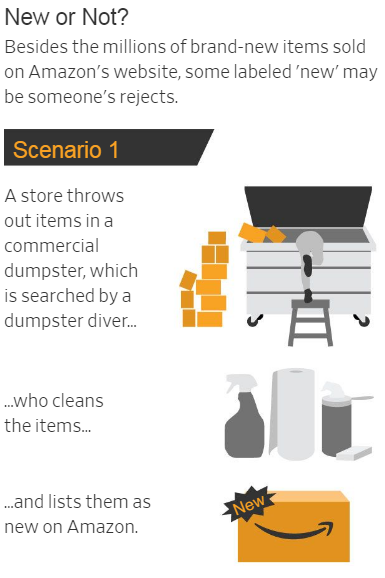
Amazon.com accused of re-selling used products itself
According to the WSJ, Amazon.com is actually part of this scam, re-selling used products as “new,” even when such practices expose consumers to potential health risks:
On Amazon’s internal discussion board, one seller complained Amazon itself was reselling returned goods. This seller, who lists earrings, wrote in a May 2018 post that Amazon said it sometimes repackages products that customers have returned and mixes them back with inventory if warehouse workers approve. This merchant wrote of asking Amazon to stop reselling the merchant’s returned earrings but said the company justified it by saying the items were inspected at the warehouse.
“I hope one day I don’t have to panic,” the merchant wrote, “every time someone returns a pair of earrings in fear that Amazon will ship it out to the next person, along with any unhygienic diseases that may be attached to it.”
In a separate investigation, Natural News has identified Amazon.com as selling a form of actual coal as a dietary supplement, even though the product has been lab tested and found to contain alarming levels of lead and aluminum, both toxic elements.
What’s clear from all this is that Amazon can’t be trusted to sell safe, clean or even NEW products. When you shop on Amazon.com, you might very well be purchasing dumpster trash.
Jeff Bezos is one of the richest persons in the world, and his empire, we now know, was built in part on a massive scam: The selling of dumpster trash as “new” products on Amazon.com.
The Health Ranger Store, in contrast, conducts extensive laboratory testing across its entire product line, conducting in-house tests on pesticides, heavy metals and microbiology to ensure its products are safe and effective. The Health Ranger Store never sells returned products. Every returned product is disposed. Every customer receives only NEW products with every purchase. That’s called operating with ethics and honesty, unlike Amazon.com which sells you dumpster trash because it’s profitable for them to do so.
What’s clear from the WSJ investigation is that anyone purchasing food or supplements from Amazon.com is now putting their own health at risk.
Kudos to the WSJ for running this in-depth investigation, exposing the total fraud and deception of Amazon.com, an online retailer run by an evil globalist named Jeff Bezos.
Tagged Under: Tags: Amazon, badfood, badhealth, badmedicine, dishonest, dumpster diving, food products, Jeff Bezos, trash


